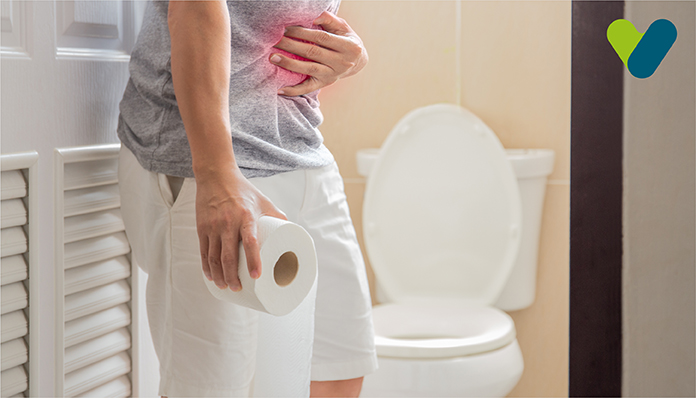Sheela and her husband developed a particularly dreadful case of diarrhea after they returned from a party with her in-laws some week. Those frequent bowel movements, awful sense of nausea, abdominal cramping, and simultaneous vomiting had them exhausted and stuck to the bed for 5 days!
Yeah, they took over-the-counter relief medicines and antibiotics but it was a bunch of home remedies that helped them fight that queasiness and dehydration during their 5-day stint in bed.
We've all been victims of diarrhea at least a couple of times in our lives. Whether it is due to a viral/bacterial infection, a terrible case of food poisoning, side effects due to an antibiotic — there's no escaping those painful disturbances in your gastrointestinal system.
Common symptoms include weakness, abdominal bloating, stomach cramps, persistent watery stools, nausea and vomiting, fatigue, etc. In some cases, the symptoms may be intense and might last up to two weeks.
However, mild diarrhea typically lasts a few hours or days and is followed by a speedy recovery. Most people can resolve symptoms on their own by taking adequate amounts of rest and indulging in some home remedies for diarrhea.
Here's a list of the most effective home remedies for upset stomach and diarrhea that helped Sheela and her husband.
5 Effective Home Remedies for Diarrhea
1. Rehydrate
Diarrhea causes dehydration so your priority should be to provide your body with the fluids that are essential for recovery. Drinking plenty of water is a given but apart from that, you should also drink an oral rehydration solution (ORS) to restore the electrolytes your body loses due to loose motions; meaning chloride and sodium.It's quite simple to create ORS at home. Take one liter of water, and mix it with 6 teaspoons or 5 grams of sugar and half a teaspoon of salt. Drink it adequately throughout the day to stay hydrated.
If you have kids undergoing diarrhea, you can opt for pediatric solutions such as Pedialyte to replenish them with potassium and sodium.
2. Recover loose motions with a good diet
When you are experiencing diarrhea, you need to eat foods that are high in fibre, pectin, potassium, electrolytes, vegetables, and protein. This includes fruit, bland soups, sweet potatoes, cooked veggies, and broths, to mention a few.What helped Sheela and her husband is the BRAT diet.
BRAT stands for Bananas, Rice, Apple Sauce, and Toast. They are proven food choices for helping people stabilize symptoms of diarrhea and digestive problems. But the BRAT diet does not provide all the nutrients your body needs so follow it for just one day from the onset of diarrhea to relieve pressure on your bowels. Thereafter, opt for smaller balanced meals throughout the day instead of heavy meals.
3. Probiotics
Among other effective loose motion, home remedies are probiotics that are known to restore healthy bacteria in your gut. Probiotics contain live bacteria that can be found in food items that are commonly present at every home like kimchi, sauerkraut, dark chocolates, Yakult, kombucha, kefir, yogurt, etc.You need to create a healthy balance of good bacteria in your intestinal tract to recover faster, especially if you are taking antibiotics.
4. Avoid greasy foods
It is best to avoid foods that can increase bloating like cruciferous vegetables or high-fiber foods. This includes green leafy veggies, broccoli, cauliflower, beans, chickpeas, peas, prunes, berries, etc. Make sure you stay away from caffeinated drinks during this period.Also, alcohol, hot drinks, milk, and carbonated drinks should be avoided as they can worsen your diarrhea.
5. Get plenty of rest
Since weakness and fatigue are quite common with diarrhea, it is necessary to rest well to gain your strength back. So, sleep as much as needed and avoid any kind of stress during the period. Symptoms of diarrhea usually resolve on their own when you take plenty of rest and take the right steps from the beginning.If your symptoms appear to be aggravating despite following the above stomach pain and loose motion home remedies, consult a doctor immediately. Sheela and her husband sought medical help within two days since symptoms didn't seem to be resolving on their own. They had a high fever and pressing abdominal pain — both of which are concerning signs.
Another sign that you should see a doctor is if your stool becomes bloody or black, and your mouth is excessively dry. Hopefully, these home remedies for diarrhea help you through those painful disruptive days and restore your digestive health in no time!


